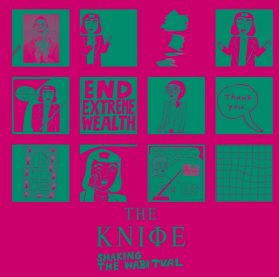By Michael Scoular (The Cascade) – Email
Print Edition: May 22, 2013
There’s a blood system promoting biology as destiny
A series of patriarchies that’s a problem to the Nth degree
What about hyper-capitalism, this homicidal class system, the school system that’s kaput?
Then there are castles everywhere—look at them fake tanning and signing autographs!
No habits!
There are other ways to do things.
– The Knife
 Poetic PR, abrasive rhythms and pointed political messages suggest the type of album that reaches for the mantle of art, demanding unbroken attention from its listener. Headphones, a straight 90 minutes, and this album. Listening as exercise.
Poetic PR, abrasive rhythms and pointed political messages suggest the type of album that reaches for the mantle of art, demanding unbroken attention from its listener. Headphones, a straight 90 minutes, and this album. Listening as exercise.
But Shaking the Habitual is also a dance record, a muddle of ideas waiting to be found, a broken contradiction.
The Knife is still a commercially-sold product, and the bulk of their “critique” steps past the slight irony and tempered outrage of their pre-release statement to oblique shouts over atonal electronic and warped material instruments that suggest more the limitations of such an exercise. Their much-publicized source being a semester’s worth of feminist and political readings paints this as an impulsive, undergraduate response to the unending problems of power displayed through class and gender.
But thankfully there are other sides to Shaking the Habitual. For every weakness that is apparent in their word-based songwriting, The Knife has a musical working considerably more advanced when it comes to their thesis. There is the basic takeaway from many of the tracks, which is basically that they are difficult: all skewed, changing time signatures and voices that refuse to tamp down into melody. As a complete, straight-through experience, Shaking the Habitual is overwhelming, probably a future cause of a few headaches. It’s deliberately esoteric and consciously unpleasant in both noise (parts of “Full of Fire”) and silence (the catacomb and sewage skitters of “Old Dreams Waiting to Be Realized”).
The Knife’s most convincing evolution, then, is what they have done to the idea of an album. This is not a staid, complete experience to be absorbed, not merely a concept, but a work that rewards reworking, separation and mixture. It is, pointedly, out of sequence, the defining progression being momentum broken up by shrieking metal. The forays into singing that shade the album’s strongest pictures dissipate into crumbling beats, and some of the tracks simply do not work. But if The Knife are meant to be taken seriously when they speak of “other ways,” it is not complete acceptance of their creation that would be the best outcome, but the provocation of thought that selects and reinterprets beyond the simple original that inspired a response.
“Full of Fire” is a strange single, for instead of providing a taste of what the rest of the album will be, it sits better on its own, dragging the B-side-like “Networking” into its pull and nothing else, an uncoiling and compressing irrepressible 10-minute overwork. Many of the “songs” here are about that length, and form movements that better separate on their own. Pressed into sequential duty, the album gives barely enough attention to each of its parts for them to leave an impression beyond the enormous quantity of itself, but spun off into their own spaces, played as singles or complementary duos, they gain traction. Separated from the harshness that becomes an overriding theme on the album, the spontaneous slight delays of modulation, the morphing quality of Dreijer’s work becomes more apparent rather than simply aggravating. And even the common refrain that Shaking the Habitual is a disappointing move away from dance hall hit-replay hits like “Heartbeats” proves unconvincing, as bookends “A Tooth for an Eye” and “Ready to Lose” are just that, but with the addition of an undercurrent that refuses to settle.
Regarding the album’s lyrics, which can’t be ignored completely, some ambiguously succinct lines seem to demand to be quoted, evoking the same kind of manifesto-like furor the act’s opening statement possesses. But then there’s the corrective that comes partway through “Raging Lung,” probably Andersson’s most affecting vocal turn, which follows up a list of demands and criticisms with “But it’s not that easy/ we want it easy.”


